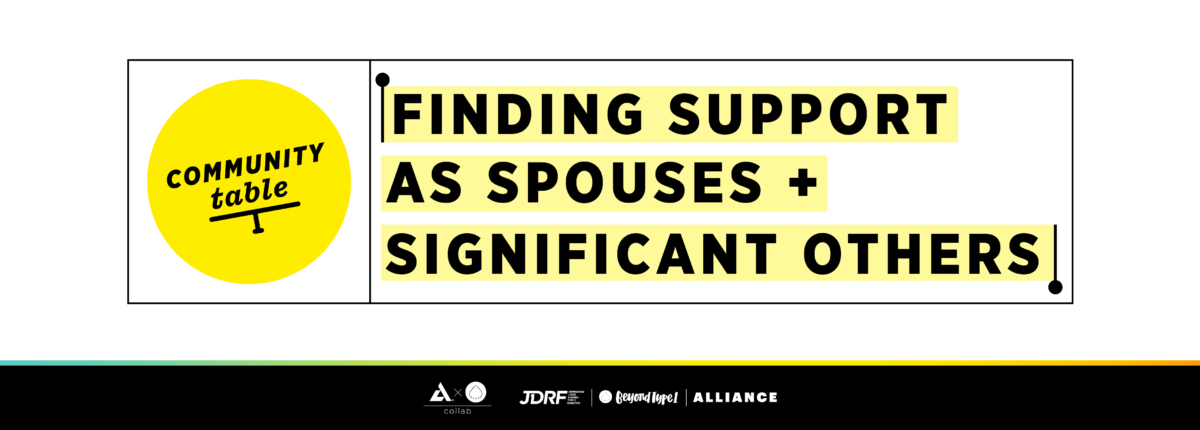Community Table: Finding Support As Spouses + Significant Others
Community Table is presented by the JDRF-Beyond Type 1 Alliance and made possible with support from Abbott Diabetes Care, Dexcom, Lilly, MannKind, Medtronic, Omnipod, Roche Diabetes Care, Tandem and Vertex, active partners of Beyond Type 1 at the time of publication.
During our second Community Table discussion in 2022, Beyond Type 1 sat down with a group of experts and community members to discuss how to find and provide support as significant others (SO) to people with type 1 and type 2 diabetes, and share helpful resources and personal perspectives. Watch the discussion in full!
Speakers included:
- Ali Abdulkareem, who served as a co-moderator for this conversation and has had type 1 for seven years, is the creator of the Youtube channel Diabetes Daily Hustle. He is also the significant other of Tarika, the other co-moderator for this conversation.
- Tarika Chhabra, who served as a co-moderator for this conversation and has had type 1 for five years, is studying to be a dietician and hopes to work with children with type 1 diabetes (T1D). She is also Ali’s SO.
- Samantha Brzozowski is the wife of someone living with type 1. Together, the couple has three children; their two daughters also live with T1D.
- Luis Felipe Paz, who has had type 1 for 11 years, is also the husband of someone living with T1D. Luis’ wife has lived with type 1 for 26 years.
The partial transcript below has been edited for clarity and length.
How did you find out your partner had diabetes?
Samantha: We both work in animal medicine, and one of the animal hospitals he worked for was bought out by the corporate hospital I worked for. When he started working at my practice, I saw he was wearing an insulin pump and I was familiar enough to know what that was, but not the nitty-gritty details of what it takes to survive daily as someone with T1D. When we met, he was persistent and wanted to go out on a date, and we hit it off right off the bat, it didn’t take much.
Unless you saw his insulin pump, [you] probably wouldn’t know that he had diabetes. We lived on our street for almost seven years before anybody knew that he has type 1. When our daughter was diagnosed, our neighbors asked, “Does it run in the family?” And I remember thinking, “Well, yeah, their dad.” He didn’t try to keep it a secret, but he manages his life and diabetes very well, never lets anything stop him and he never skips a beat. He makes the best of every moment of every single day. I took that and kind of ran with it, too. He does everything he wants to do, it hasn’t been any kind of obstacle that I was aware of.
Tarika: When I was diagnosed, I just turned 25. I didn’t know what to do, I didn’t know how to move forward with life. I used social media to find other people with type 1 and I came across his page [Diabetes Daily Hustle]. I lived in Missouri at the time, so I don’t even know how I came across someone who lives in California, but I followed. He was funny, we had similar interests aside from diabetes and we responded to each other’s [Instagram] stories. I was already moving [to California] to go to school, we met, and the rest is history.
When you started learning about your or your SO’s diabetes, what were some questions or resources you had that were really important?
Luis: I knew the general things regarding how to care for yourself and how to care for someone with diabetes, but I didn’t know much about insulin pumps. My wife used an insulin pump, and the main thing I started learning from her was how to use it properly and how she managed her diabetes with it.
Samantha: My husband was from a very small town when he was diagnosed, but he was leaving to go to college and he didn’t have anybody to reach out to. He was self-sufficient and on his own, and he was used to managing his diabetes. It wasn’t until our daughter, Vivian, was diagnosed that I started to realize how isolating it can be, because I’m never going to know what it’s like truly to live with T1D, even when everybody in my house lives with it.
I realized pretty quickly that he needed to get connected to other people. I told him almost right away that I was going to start looking on Facebook. I said, “There has to be groups out there: young adults, parents. I think that you need to get involved in the community. I know I definitely need to because I need other moms to support me.” Now, my husband is connected with so many other people with T1D and it’s helped him better manage his diabetes. He’s learned so much and there were so many other great resources that were available that he didn’t know about.
Tarika: Instagram of course was very helpful for me. I was diagnosed in St. Louis, Missouri, but for some reason, they’re not open about it out there. I moved to San Diego a year and a half after diagnosis and everyone’s open about it out here; there are a lot of meetups and resources which have been super helpful. When you meet others with type 1, you have conversations and you’re always learning.
Luis: I already knew about the difficult parts of diabetes because I had diabetes myself, but I thought I knew what it felt like to have hypoglycemia or hyperglycemia. I had never seen it on somebody else though. There’s a moment when you actually think, “Whoa, I am no fun when I have hyperglycemia.” I see myself reflected in her and she does, as well, in me. That’s the challenge, but it’s also one of the most rewarding things about both of us having diabetes.
What are some ways you help support your partner?
Samantha: I can only think of one specific moment with my husband, he’s a pretty resilient dude. He rolls with the punch no matter what happens. But there was a moment we had gone on a trip to South Padre Island and he thought his Medtronic pump was splash-proof, but he got hit by a wave and his pump stopped working. This was also prior to us having kids, and we didn’t bring a lot of extra supplies back then. I remember him being very frustrated because we had to stop everything, he didn’t have any needles to do injections.
That’s really the only time I remember seeing him frustrated. Now, he’s one of a handful of pilots in the United States with his commercial pilot’s license. He really perseveres through about anything and everything.
Luis: Communication is the most important thing, and it’s the easiest thing for us. Because we truly understand what it’s like to have diabetes, we let the other one know exactly how we’re feeling.
We also feel like we know what being burnt out means. I know what she’s going through, and she knows what I’m going through. We know what being fed up and tired of diabetes is like, and can completely relate to that. At the same time, we push ourselves to be completely open and never try to minimize it or downplay it.





